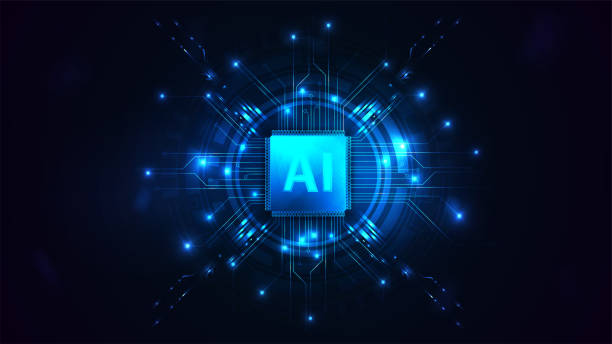What is Artificial Intelligence? Definitions and Basic Concepts
Artificial intelligence (AI) is a branch of computer science that deals with building machines capable of performing tasks that usually require human intelligence.
These tasks include learning, problem-solving, pattern recognition, natural language understanding, and decision-making.
#Artificial_Intelligence seeks to simulate human thinking processes and impart these abilities to computer systems.
In other words, artificial intelligence allows computers to learn and adapt to new experiences without explicit programming.
In recent decades, with remarkable advances in algorithms and hardware, artificial intelligence has increasingly penetrated our daily lives, from smart voice assistants to self-driving cars.
Artificial intelligence is not just a single concept, but a collection of different techniques and approaches, each with its own specific applications.
Machine learning, deep learning, natural language processing, and computer vision are just a few examples of important sub-branches of this field.
Each of these sub-branches uses specific algorithms and mathematical models to solve various problems.
For example, deep learning, using artificial neural networks, is able to identify complex patterns in voluminous data, while natural language processing enables computers to understand and generate human language.
Are you losing business opportunities because of an outdated website? With Rasaweb, solve the problem of not attracting potential customers through your website forever!
✅ Attract more high-quality leads
✅ Increase brand credibility in the eyes of customers
⚡ Get a free corporate website design consultation
History and Evolution of Artificial Intelligence
The history of artificial intelligence dates back to the 1950s, when researchers first began to explore the possibility of building machines that could think like humans.
The Dartmouth Conference in 1956 is often considered the official starting point of artificial intelligence.
In the early decades, artificial intelligence was accompanied by great hopes and expectations, but it soon became clear that building machines with general intelligence (AGI) was much more complex than imagined.
Click here to preview your posts with PRO themes ››
Over the years, artificial intelligence has faced numerous ups and downs.
Periods known as “AI winters” due to lack of funding and limited progress.
However, each period of recession has been accompanied by new advances and revitalization.
The emergence of new algorithms, the increased processing power of computers, and access to large data have all contributed to recent advances in artificial intelligence.
Today, artificial intelligence is evolving and rapidly penetrating various industries.
From healthcare to finance and transportation, artificial intelligence has the potential to change the way we work and live.
As technology continues to advance, artificial intelligence can be expected to play an even more important role in the future.
Applications of Artificial Intelligence in Various Industries
The applications of artificial intelligence are vast and diverse, affecting almost every industry.
In the healthcare industry, artificial intelligence is used to diagnose diseases, develop new drugs, and provide personalized care.
In finance, artificial intelligence is used to detect fraud, manage risk, and provide improved customer service.
In the transportation industry, self-driving cars and intelligent traffic management systems use artificial intelligence to improve safety and efficiency.
One of the important applications of artificial intelligence in the manufacturing industry is the automation of processes and the improvement of product quality.
Robots equipped with artificial intelligence can perform repetitive and dangerous tasks, while machine vision systems can identify product defects and prevent them from entering the market.
In the retail industry, artificial intelligence is used to provide personalized shopping experiences, predict demand, and optimize the supply chain.
Artificial intelligence also plays an important role in the development of new technologies such as the Internet of Things (IoT) and blockchain.
Combining artificial intelligence with these technologies enables the creation of intelligent and automated systems that can make decisions independently and interact with their environment.
| Industry | Application of Artificial Intelligence |
|---|---|
| Healthcare | Disease diagnosis, drug development |
| Finance | Fraud detection, risk management |
| Transportation | Self-driving cars, traffic management |
What are the differences between Machine Learning and Deep Learning?
Machine learning (ML) and deep learning (DL) are two related but distinct concepts in the field of artificial intelligence.
Machine learning is a broader branch that includes various algorithms and techniques for training computers to learn from data without explicit programming.
Deep learning is a subset of machine learning that uses artificial neural networks with multiple layers (so-called “deep”) to analyze data.
The main difference between machine learning and deep learning is in how features are extracted from data.
In traditional machine learning, engineers must manually extract important features from the data and provide them to the learning algorithm.
In deep learning, neural networks automatically extract important features from the data, which is especially useful for complex data such as images and text.
In short, deep learning is a powerful method for machine learning that allows computers to identify complex patterns in large amounts of data.
However, deep learning usually requires more data than traditional machine learning and is also more computationally expensive.
Are you frustrated with the low conversion rate of your online store?
Rasaweb, with its professional e-commerce website design, is your definitive solution!
✅ Increase your sales and revenue
✅ Unique user experience for your customers
⚡ Get a free consultation now!
Challenges and Limitations of Artificial Intelligence
Despite the remarkable advances in artificial intelligence, this technology still faces numerous challenges and limitations.
One of the main challenges is the need for large, high-quality data to train artificial intelligence models.
Collecting and labeling data can be time-consuming and costly, and a lack of sufficient data can lead to poor model performance.
Another challenge is the issue of bias in data.
If the training data contains biases present in society, artificial intelligence models will also learn these biases and apply them in their decision-making.
This can lead to unfair and discriminatory results.
In addition, artificial intelligence models often act as “black boxes,” meaning it is difficult to understand how they arrive at a particular result.
This lack of transparency can reduce trust in artificial intelligence and limit its use in some applications.
Ethical issues are also a major challenge in the field of artificial intelligence.
With the increasing use of artificial intelligence, important questions are raised about accountability, privacy, and the impact of artificial intelligence on employment.
It is necessary to create appropriate ethical and legal frameworks to regulate the development and use of artificial intelligence to prevent misuse of this technology.
Impact of Artificial Intelligence on the Labor Market and Employment
Artificial intelligence has the potential to significantly impact the labor market and employment.
On the one hand, artificial intelligence can automate many tasks, leading to job losses in some industries.
On the other hand, artificial intelligence can create new job opportunities, especially in areas related to the development, deployment, and maintenance of artificial intelligence systems.
Some experts predict that artificial intelligence could eliminate millions of jobs worldwide by 2030, while others believe that artificial intelligence will ultimately lead to the creation of more jobs than it eliminates.
In any case, it is clear that the workforce must prepare for the changes caused by artificial intelligence.
Education and retraining will be crucial to help workers transition to new, artificial intelligence-related jobs.
In addition, artificial intelligence can change the role of workers and enable them to focus on more creative and strategic tasks.
For example, artificial intelligence can automate repetitive and time-consuming tasks, allowing workers to spend more time solving complex problems and innovating.
What will the future of Artificial Intelligence be?
The future of artificial intelligence looks very bright, and this technology can be expected to experience remarkable advances in the coming years.
One important trend is the development of artificial general intelligence (AGI), which refers to machines that can perform tasks at or above the level of human intelligence.
Achieving AGI is a major challenge, but some researchers believe that it will be possible in the coming decades.
Another trend is the development of explainable artificial intelligence (XAI), which refers to artificial intelligence systems that can explain how they arrived at a particular result.
XAI can increase trust in artificial intelligence and facilitate its use in sensitive applications such as medicine and law.
In addition, artificial intelligence can be expected to increasingly integrate with other technologies such as the Internet of Things, blockchain, and augmented reality, enabling the creation of intelligent and automated systems.
As technology continues to advance, artificial intelligence has the potential to change the way we live, work, and interact with the world.
However, it is necessary for the development and use of artificial intelligence to be done carefully and responsibly to prevent misuse of this technology and to benefit everyone.
| Trend | Description |
|---|---|
| Artificial General Intelligence (AGI) | Machines with human-level or higher intelligence |
| Explainable Artificial Intelligence (XAI) | Artificial intelligence systems that explain how they arrived at a result |
| Integration with other technologies | Combining artificial intelligence with the Internet of Things, blockchain, and augmented reality |
Resources and Tools for Learning Artificial Intelligence
If you are interested in learning artificial intelligence, many resources and tools are available to you.
Online courses, books, articles, and practical projects can all help you learn artificial intelligence concepts and techniques.
Sites like Coursera, edX, and Udacity offer numerous online courses in artificial intelligence taught by leading universities and experts.
In addition to online courses, there are many books on artificial intelligence that can help you learn basic and advanced concepts.
Books such as “Artificial Intelligence A Modern Approach” by Stuart Russell and Peter Norvig, and “Deep Learning” by Ian Goodfellow, Yoshua Bengio, and Aaron Courville are among the reference books in this field.
Also, there are many websites and blogs that provide useful articles and tutorials on artificial intelligence.
To gain practical experience in artificial intelligence, you can participate in open-source projects or do your own personal projects.
Tools like TensorFlow, PyTorch, and scikit-learn are powerful libraries that can help you develop and deploy artificial intelligence models.
With practice and experience, you can improve your skills in artificial intelligence and prepare to enter this field.
Are you frustrated with the low conversion rate of your online store? Rasaweb turns your online store into a powerful tool for attracting and converting customers!
✅ Significantly increase the conversion rate of visitors to buyers
✅ Unique user experience to increase customer satisfaction and loyalty⚡ Get a free consultation from Rasaweb now!
Artificial Intelligence in Iran: Prospects and Opportunities
Artificial intelligence is also developing in Iran, and there are many opportunities for growth and innovation in this field.
The Iranian government supports the development of artificial intelligence and has programs to promote education, research, and investment in this area.
Universities and research centers in Iran are conducting research projects in various areas of artificial intelligence, and startups are emerging that offer artificial intelligence-based solutions for various problems.
One area where artificial intelligence can play an important role in Iran is agriculture.
Artificial intelligence can be used to optimize irrigation, diagnose plant diseases, and increase agricultural productivity.
In industry, artificial intelligence can be used to automate processes, improve product quality, and reduce costs.
In healthcare, artificial intelligence can be used to diagnose diseases, provide personalized care, and develop new drugs.
Given the high potential of artificial intelligence to solve problems and improve people’s lives, investment in this area can contribute to economic growth and social development in Iran.
It is necessary for the government, universities, and the private sector to work together to create an ecosystem that supports the development and use of artificial intelligence in Iran.
Key Points and Summary
In this article, we have provided a comprehensive overview of artificial intelligence, its history, applications, challenges, and future.
Artificial intelligence is a powerful technology that has the potential to change the way we live and work.
However, it is necessary for the development and use of artificial intelligence to be done carefully and responsibly to prevent misuse of this technology and to benefit everyone.
As a powerful tool, artificial intelligence can help us solve complex problems, improve efficiency, and create new opportunities.
Machine learning and deep learning, as the main sub-branches of artificial intelligence, provide many possibilities for data analysis and intelligent decision-making.
Given the widespread impact of artificial intelligence on various industries and the labor market, it is essential for individuals and organizations to prepare for the adoption and use of this technology.
Investing in artificial intelligence education, research, and development can help countries compete globally and achieve economic and social progress.
Finally, artificial intelligence is an adventurous and exciting journey that requires continuous learning and international cooperation.
With effort and perseverance, we can harness the full potential of this technology and create a brighter and smarter future for ourselves and future generations.
Frequently Asked Questions
| Question | Answer |
|---|---|
| What is the definition of هوش مصنوعی (Artificial Intelligence)? | It is a field in computer science that aims to create intelligent machines that can think, learn, solve problems, and make decisions like humans. |
| Mention some common applications of artificial intelligence. | These include self-driving cars, voice assistants (such as Siri and Alexa), recommendation systems (such as Netflix and Amazon), facial recognition, and medical diagnosis. |
| What is the difference between Narrow Artificial Intelligence (ANI) and General Artificial Intelligence (AGI)? | Narrow Artificial Intelligence is specialized in a single and specific task, while General Artificial Intelligence possesses human intellectual ability to perform any cognitive task. |
| What is Machine Learning and its relationship to Artificial Intelligence? | Machine learning is a branch of artificial intelligence that focuses on developing algorithms that allow systems to learn from data without explicit programming. |
| What are Artificial Neural Networks? | They are computational models inspired by the structure and function of the human brain, and are used in deep learning to process data and discover complex patterns. |
| Mention some ethical challenges related to artificial intelligence. | These include issues of privacy, bias in data and algorithms, job loss, and accountability in case of errors or unfair decisions. |
| What is Natural Language Processing (NLP)? | It is a branch of artificial intelligence that focuses on enabling computers to understand, interpret, and generate human language in a useful and interactive way. |
| How can artificial intelligence affect the labor market? | It can lead to the automation of some routine tasks, requiring retraining of workers and creating new jobs in the areas of designing, developing, and maintaining artificial intelligence systems. |
| What is Computer Vision? | It is a field in artificial intelligence that enables computers to “see,” understand, and interpret images and videos in the same way that humans do, enabling them to recognize objects and faces. |
| What is the importance of data in developing artificial intelligence systems? | Data is the fuel that feeds artificial intelligence systems, especially in machine learning. The quality and quantity of data greatly affect the accuracy and performance of models and their ability to learn and make the right decisions. |
And other services of Rasa Web Advertising Agency in the field of advertising
Smart Website Development: A novel service for increasing campaign management by customizing the user experience.
Smart Brand Identity: A novel service for increasing click-through rates through precise audience targeting.
Smart Sales Automation: A novel service for increasing customer acquisition through precise audience targeting.
Smart Link Building: A combination of creativity and technology to attract customers through custom programming.
Smart Advertising Campaign: Transform customer acquisition by optimizing key pages.
And more than a hundred other services in the field of internet advertising, advertising consulting, and organizational solutions
Internet Advertising | Advertising Strategy | Advertisement Report
Sources
Artificial Intelligence and Its Applications
,What is Artificial Intelligence? Let’s Understand Artificial Intelligence in Simple Terms
,What is Artificial Intelligence Literacy and What Are its Applications?
,Comprehensive Article on Artificial Intelligence: Applications, Advantages, Disadvantages, Types, History, and Future
? To soar in the digital world and reach more customers, Rasaweb Digital Marketing Agency is with you by providing innovative and result-oriented solutions. From custom website design and SEO optimization to professional social media management, we give your business a powerful identity that will remain in the minds of the audience. Contact us and transform the future of your business.
📍 Tehran, Mirdamad Street, next to the Central Bank, South Kazerun Alley, Ramin Alley, No. 6












